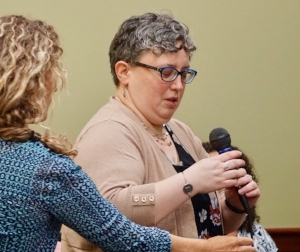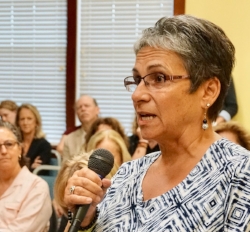For RI Adults With DD, Work Is A Choice, Not A Mandate, Says Federal Civil Rights Consent Decree
/Kiernan O’Donnell, foreground, addresses DDD public forum in East Providence, RI, while Charles Moseley, independent federal court monitor in Rhode Island’s Olmstead consent decree case, participates via video link. All photos by Anne Peters.
By Gina Macris
It’s no secret that Rhode Island’s Olmstead consent decree has put the focus on employment opportunities – and challenges –in the system of state-funded services for adults with developmental disabilities.
Four and a half years after the consent decree took effect, the state Division of Developmental Disabilities (DDD) still finds it necessary to punch holes in the myths about what the state’s Employment First policy means and doesn’t mean. Employment First was created to respond to the consent decree’s push toward integration of those isolated in sheltered workshops and day programs, as required by the Olmstead decision of the U.S. Supreme Court, which reaffirmed a key part of the Americans With Disabilities Act.
“We’ve had a lot of people worry that if they don’t work, they won’t get benefits,” said Anne LeClerc, Associate Director of Program Performance.
That’s simply not true, LeClerc told about 80 people crammed into a room at the East Providence Senior Center and an unknown number of others who watched the presentation live on Facebook from the comfort of their homes.
Tina Spears, L, hands Microphone to Anne LeClerc
LeClerc said there’s there’s no requirement that adults with developmental disabilities who receive state-funded services must work, but if they want to be employed, the state will provide job-related supports.
“Not everyone has to work, or is ready for work now,” she said. Individuals may have health or family issues that prevent them from working. It may take “a long time” for people to prepare for work in various ways, LeClerc said.
The federal court monitor in the consent decree case, Charles Moseley, chimed in via video link:
The consent decree requires those who choose not to work to make an “informed choice,” he said. What makes a decision an informed choice are trial work experiences, with the appropriate supports, and a vocational assessment, Moseley said.
And back in East Providence, Kiernan O’Donnell added a third element of informed choice: individualized benefits counseling from a specially-trained expert in how a paycheck might affect Social Security or other financial support received by a person with disabilities.
O’Donnell is co-president of the Rhode Island chapter of the Association of People Supporting Employment First (RIAPSE.)
He said Social Security benefits are so complicated that only specially trained counselors are qualified to recommend work options to individuals receiving public assistance. (The Paul Sherlock Center on Disabilities at Rhode Island College offers free Work Incentives Public Information Sessions. For more information, click here.
The “Variance”
LeClerc, meanwhile, said individuals 62 years old and older who don’t want to work may simply choose to retire.
People younger than 62 who opt out of the job market must submit a variance to the state’s Employment First policy, LeClerc explained, “A variance is just documentation of a decision not to work,” she said.
The variance form asks why “work is not right for you,” LeClerc said. Someone prevented from working by poor health need simply note that as a reason, but no medical documentation is necessary, she said.
Ken Renaud, a leader in the family advocacy group RI FORCE, asked whether the variance is something that must be revisited “every single year.”
“The variance itself is a one-time thing,” LeClerc replied. During individual service plan meetings held annually, those individuals who have previously chosen variances will simply be asked whether they’re still happy with their decisions not to work. If not, they may reconsider.
One member of the audience told LeClerc about the experiences of individuals over retirement age whose individual service plans were rejected because they didn’t have a career development component. Individual service plans are important documents used by DDD to document the services that Medicaid will pay for.
LeClerc said the service plans shouldn’t have been turned back; the career development component could have been simply marked “retired.”
“We’ll work on making that clearer,” she said.
If the problem occurs again, LeClerc told the woman, consumers and their advocates should get in touch with her. ( LeClerc can be reached at 401-462-0192 or Anne.LeClerc@bhddh.ri.gov.
Fact vs Myth
O’Donnell, the RIAPSE leader, sought to give the audience a toolkit for myth-busting that went far beyond the correction of one falsehood. “Knowledge is power,” he said. “Lack of knowledge can prohibit people from pursuing their dreams. Myths sometimes rule the dreams you pursue or don’t pursue.”
O’Donnell’s general advice: get the information in writing. APSE, the national organization of supported employment advocates and professionals, offers its own fact sheet busting the “Top Ten Myths” of Social Security Benefits.
“Let’s not get hung up on barriers when we are able to combat them with knowledge,” he said.
Worries About Funding
Mary Beth Cournoyer, who serves on a community advisory committee, the Employment First Task Force, said that many people looking for jobs need “customized employment” – self-employment or work individually designed to match the skills of a particular employee with the needs of an employer.
For example, someone with a disability can be trained for a part-time job running the paper shredder at a large law firm, freeing support staff for other duties.
The idea of customized employment is “new to families,” said Cournoyer, who has a son with a developmental disability. Parents feel that they may need 30 hours of job coaching, but only have enough funding for 10 hours, she said.
“I don’t want to see jobs and capacity missed because we don’t have enough money for a coach,” she said.
Moseley said Cournoyer’s concerns about funding for services “is a great question for Kerri” – a reference to Kerri Zanchi, Director of Developmental Disabilities.
Funding “is a challenge. It might change,” he said.
Moseley segued to initiatives that might improve the outlook for adults with developmental disabilities and their families, including a commission, chaired by State Rep. Louis DiPalma, D-Middletown, to study the effectiveness of the current funding system. The commission is expected to convene in October.
In August, Moseley said, he talked to private service providers about changes they are making. “There are a lot of exciting things moving forward, but also barriers,” he said.
Zanchi, meanwhile, ticked off initiatives of DDD, including the preparation of an application to the Centers for Medicare and Medicaid Services for approval of a pilot Alternative Payment Model that would give providers a flat rate for a defined bundle of services rather than the current fee-for-service reimbursements that providers say restrict their flexibility to meet clients’ needs.
Zanchi and LeClerc both emphasized improvements in data collection that will help them better identify and respond to the needs of those served by the developmental disability service system.
“Thanks for being here,” LeClerc said with a smile, addressing the audience, “and for bringing these things up constantly.”
Met by a round of laughter, LeClerc added, “I mean that sincerely. “
Lenore Costa
One mother, Lenore Costa, said her son, who has Fragile X syndrome, has not been able to get any developmental disability services in the year the family has lived in Rhode Island. Costa said she moved from Massachusetts, where her son received day, evening and weekend services, to take advantage of a professional opportunity as a nursing executive.
It’s a big job, she said, but her son’s needs are also a full-time job.
Zanchi connected Costa with a DDD social work supervisor, who sat down with her after the meeting.
Deborah Masland, part of a consumer panel that offered commentary on the meeting, said “people’s jobs should not be threatened because they can’t find services for a loved one.”
Masland works at the Rhode Island Parent Information Network with families facing special health care needs and has a 19- year-old daughter, Olivia, who has loved her 12 years of schooling and is now in her first transition year.
Olivia has a work trial in food prep at a Chili’s restaurant 45 minutes a week, and while she’s excited about her t-shirt, her hat, and her special work shoes, her mother said she’s not sure that the experience is preparing her for a job.
Quality of Leisure Activities Questioned
Anne Peters said her 27-year-old daughter has been looking for a job for three years, and any work she finds will be part time. With that in mind, she asked whether the emphasis on jobs is jeopardizing the quality of non-work day services.
Heather Mincey, the assistant director of developmental disability services, said that was a hard question to answer on an individual basis.
Job-related supports cost more than non-work services, but they both come out of a fixed funding authorization for a particular individual. Mincey suggested that over time, the funding for work and non-work activities will even out if job supports eventually can be faded away.
With the closing of some day programs, Peters said, there are a “lot of movies and malls” for “non-work services,” suggesting that more purposeful activities would better meet quality standards.
Mincey acknowledged that it is difficult for providers to shift from center-based care to integrated services. She noted that DDD recently hired two quality assurance officials to work with LeClerc for a year on program improvements.
Peters added that addressing high turnover and low wages among support staff is a critical part of any solution to the problems the system faces.
Christopher Semonelli, vice-president of RI FORCE (Families Organized For Reform Change and Empowerment) said members of the General Assembly need to hear the breadth and depth of concerns expressed at quarterly public forums.
He said RI FORCE will sponsor a candidates’ forum Oct. 3 from 4 to 7 p.m. at the Newport campus of the Community College of Rhode Island.
Advocacy is “huge,” he said, but “you can only eat an elephant one bite at a time.”
(RI FORCE streamed the public forum live on Facebook and the video remains on its Facebook page.)









